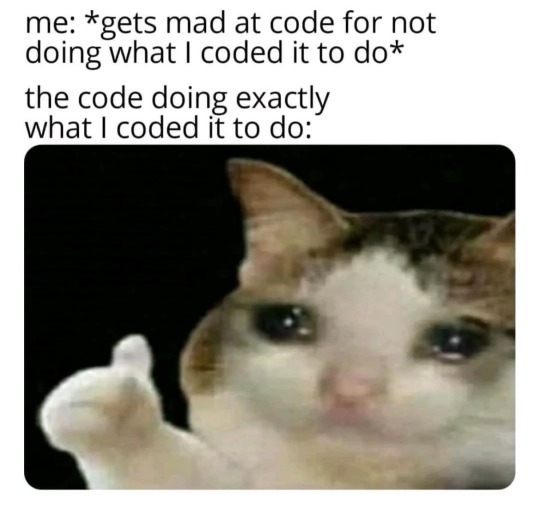#full stack software development
Explore tagged Tumblr posts
Text
#Hire Full Stack Developers#hire dedicated full stack developer#hire full stack web developer#full stack development company#full stack software development
0 notes
Text
Learn the secrets to mastering full-stack development. Bridge frontend and backend seamlessly for comprehensive software engineering expertise.
0 notes
Text
#learn programming#career development support#full stack software development#software engineering immersive#software engineering immersive program
0 notes
Text
What is the Process of Java Full Stack? The Developer's Easy Guide
If you're considering a career in development, Java has undoubtedly crossed your mind. Additionally, you've probably heard of the terms front-end, back-end, and Java full-stack. What does it all imply, though? Getting into web development is a smart move in the modern world. The web development sector offers a variety of rewarding professional opportunities.
Since technology isn't going away any time soon, tech professions are well-known for being plentiful and dependable. What exactly is Java full-stack then? Let's examine the answer to that query and then discuss how to become a full-stack Java developer. Additionally, take a look at our course on Introduction to Software Development Courses if you want a comprehensive guide to the subject.
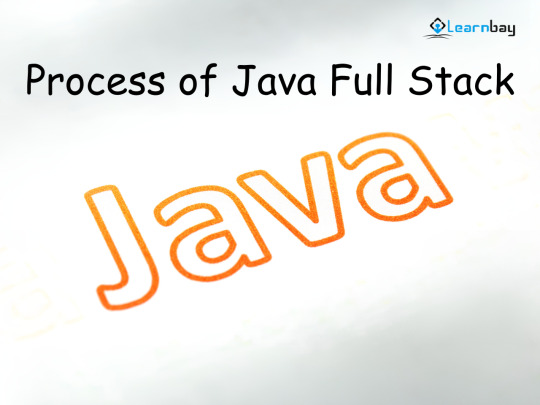
#java#java programming#java full stack developer#java full stack training#full stack#full stack software development#full stack web development#software development#web development
0 notes
Text
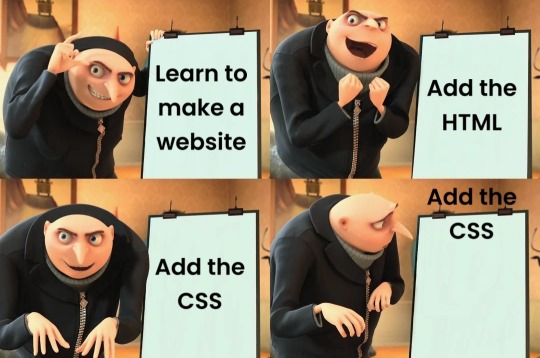
#programmer humor#programming#geek#nerd#programmer#technology#computer#phone#mac#windows#os#operating system#website#web development#dev#developer#development#full stack developer#frontend#backend#software#hardware#html#css#meme#despicable me#gru#joke#software engineer#apple
474 notes
·
View notes
Text
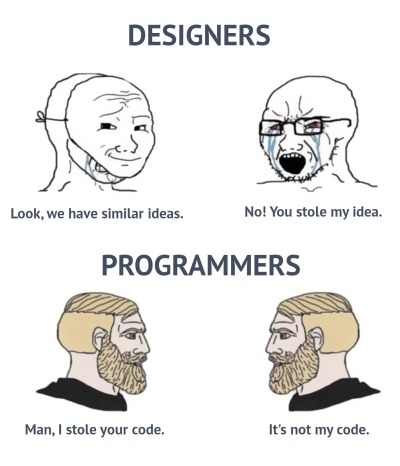
When you find out that your 'original' code is just a copy of a copy of a copy...
#programmer humor#programming#geek#nerd#programmer#computer#python#laptop#c#meme#pc#computer science#java#developer#software developers#full stack web development#code#cs#javascript#c++#software engineer#software development#dev#web development
133 notes
·
View notes
Text
back in the Superwholock days there was this post getting passed around my corner of tumblr about "teflon writing vs velcro writing," ostensibly as a nutshell summary of why fandom reacted so differently to Steven Moffat and Russell T Davies as Doctor Who showrunners: slick and polished and easier to admire (when done well) or coolly assess its flaws (when botched) than to get a grip on or pull apart & tinker with, vs. messy and prickly and grippy and tinkering-friendly and prone to getting its hooks in you whether or not you ever wanted that
and that's very funny to look back on with the distance of hindsight, because to this day--a full decade after peak Superwholock--RTD-era Who and Kripke-era SPN remain THE most insane, crazymaking, irreversible-brain-damage-inducing, "compelling in the way where they make me INCREDIBLY ANGRY and ITCHY TO FIX THEM because i am so stupid-invested that they still have me by the balls, even when my engagement is just picking apart the frustrations of how and why they SUCK" turbo-examples of velcro writing i have ever encountered in my LIFE
hell, they aren't even so much like velcro as they're like snagging the folds of a lace circle skirt on a whole branch of actual cockleburs and trying to wash the shrapnel out with fucking gorilla glue
.....and then there's BBC Sherlock. which was neither velcro writing nor teflon writing but an elaborate many-year con, targeted at the EXACT kinds of people who maintain a secret good Supernatural that lives in their heads, whose one neat trick was to bait its marks into collectively hallucinating a brilliant show so that Steven Moffat and Mark Gatiss never had to put themselves to the trouble of writing one.
#computer tinkerers hear me out: if spn is microsoft windows and doctor who is various *nix distros and moffat-era who is macOS#then bbc sherlock is a fucking chromebook that reply guys SWEAR you can do full-stack software development and advanced image editing on#....if you root it and use some horrible 3rd party script to bolt a linux distro on top of chromeOS and physically install 32gb extra RAM#and even then the filesystem access is all screwy and *you're still doing your image editing in the GIMP*#fandom#superwholock#meta
82 notes
·
View notes
Text
Finally got OAuth working!!!!
The war is over. Figured out the hard way that OAuth makes the routes for you <3
Now I can start coming up with models to store the data from users. If anyone has any ideas on how I should make those relationships with other data tables for songs and artists let me know. I’m going to reblog this post with some of my own ideas.
I also have a login page and dashboard with hard coded data to get a sense of what I want the backend to supply. Good progress! Will also reblog with pictures of that.
#coding#software engineering#baby coder#web developers#web development#nodejs#ruby#spotify api#reactjs#ruby on rails#software development#full stack developer
4 notes
·
View notes
Text

Even though 2023 was a really good year for me personally, 2024 was quite bad... And 2025 seems to be going the same way.
And I'm not even in the US of A!
Since they say it's a good thing to celebrate the small things in life, here's one of them: today is my very first day back in University, 10 years after getting my bachelor's degree!!! 🎉
A different University, and a completely different study subject (since I'm trying to change careers and all...)!! I'm really excited!!! 🤓
So... If I'm not around much anymore, you guys know why! 💜

Please keep sending all the Mycroft and/or Mystrade fics my way. Thank you! lol
#student life#software development#front end development#back end development#full stack developer#BUT STILL IN NEED OF#MYCROFT HOLMES#AND#MYSTRADE#AO3 FANFIC#FANFIC#FANFICTION#😄 💜
5 notes
·
View notes
Text
Fellow programmers:
#full stack developer#code#codeblr#studyblr#study motivation#motivation#tumblr polls#my polls#my post#developer#front end development#software development#software#backenddevelopment#frontend developer#html5 css3#backend frameworks#frontenddevelopment#html css
10 notes
·
View notes
Text
How to become full-stack developer in just 8 steps:

Step 1:- Learn HTML and CSS.
Step 2:- Learn JavaScript.
Step 3:- Learn React, Node.js
Step 4:- MySQL
Step 5:- MongoDB
Step 6:- Git Commands.
Step 7:- Build Projects and Push on GitHub.
Step 8:- Practice, Practice and Practice.
Anyone can be cool, But Awesome takes practice.
Trust me it takes time but you can do it.
#full stack development#full stack developers#webdevelopment#programming#progblr#codeblr#learn to code#learning#coding#studyblr#software
27 notes
·
View notes
Text
Hire Full Stack App Development Team
Looking to transform your digital vision into reality? Look no further! LevelUP, a leading name in the tech industry, is your go-to partner for Full Stack App Development. Our seasoned Full Stack App Development Team is well-versed in the latest technologies, ensuring your project is ahead of the curve. Timely delivery and quality assurance are the pillars of our service. Your project's success is our priority. Full Stack App Development Team from LevelUP brings a holistic approach to your project. From frontend design to backend functionality, our experts ensure a seamless and integrated user experience. To know more https://thelevelup.team/hire-full-stack-developers/
#Hire Full Stack App Development Team#Top Full Stack Development Services#full stack development company#full stack software development
1 note
·
View note
Text
Any MCR fans in software engineering/web dev?
I'm looking for mutuals who love to code and also love MCR. I wanna do a little project >:D also just want some buds to relate to.

#my chemical romance#mcr#software engineering#web development#web developers#python#c++ programming#programming#programmer#github#coding#baby coder#codeblr#react#java#javascript#reactjs#frontenddevelopment#learntocode#webdev#nodejs#full stack developer#gerard way#frank iero#my chem gerard#mikey way#ray toro
2 notes
·
View notes
Text
Which is better full stack development or testing?
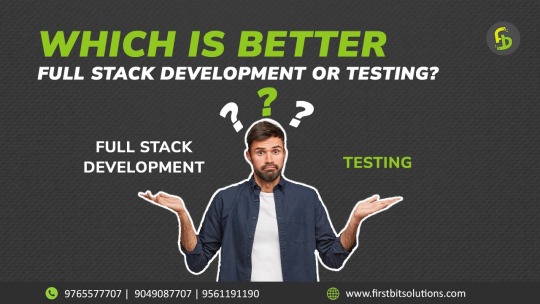
Full Stack Development vs Software Testing: Which Career Path is Right for You?
In today’s rapidly evolving IT industry, choosing the right career path can be challenging. Two popular options are Full Stack Development and Software Testing. Both of these fields offer unique opportunities and cater to different skill sets, making it essential to assess which one aligns better with your interests, goals, and long-term career aspirations.
At FirstBit Solutions, we take pride in offering a premium quality of teaching, with expert-led courses designed to provide real-world skills. Our goal is to help you know, no matter which path you choose. Whether you’re interested in development or testing, our 100% unlimited placement call guarantee ensures ample job opportunities. In this answer, we’ll explore both career paths to help you make an informed decision.
Understanding Full Stack Development
What is Full Stack Development?
Full Stack Development involves working on both the front-end (client-side) and back-end (server-side) of web applications. Full stack developers handle everything from designing the user interface (UI) to managing databases and server logic. They are versatile professionals who can oversee a project from start to finish.
Key Skills Required for Full Stack Development
To become a full stack developer, you need a diverse set of skills, including:
Front-End Technologies: HTML, CSS, and JavaScript are the fundamental building blocks of web development. Additionally, proficiency in front-end frameworks like React, Angular, or Vue.js is crucial for creating dynamic and responsive web interfaces.
Back-End Technologies: Understanding back-end programming languages like Node.js, Python, Ruby, Java, or PHP is essential for server-side development. Additionally, knowledge of frameworks like Express.js, Django, or Spring can help streamline development processes.
Databases: Full stack developers must know how to work with both SQL (e.g., MySQL, PostgreSQL) and NoSQL (e.g., MongoDB) databases.
Version Control and Collaboration: Proficiency in tools like Git, GitHub, and agile methodologies is important for working in a collaborative environment.
Job Opportunities in Full Stack Development
Full stack developers are in high demand due to their versatility. Companies often prefer professionals who can handle both front-end and back-end tasks, making them valuable assets in any development team. Full stack developers can work in:
Web Development
Mobile App Development
Enterprise Solutions
Startup Ecosystems
The flexibility to work on multiple layers of development opens doors to various career opportunities. Moreover, the continuous rise of startups and digital transformation initiatives has further fueled the demand for full stack developers.
Benefits of Choosing Full Stack Development
High Demand: The need for full stack developers is constantly increasing across industries, making it a lucrative career choice.
Versatility: You can switch between front-end and back-end tasks, giving you a holistic understanding of how applications work.
Creativity: If you enjoy creating visually appealing interfaces while also solving complex back-end problems, full stack development allows you to engage both creative and logical thinking.
Salary: Full stack developers typically enjoy competitive salaries due to their wide skill set and ability to handle various tasks.
Understanding Software Testing
What is Software Testing?
Software Testing is the process of evaluating and verifying that a software product or application is free of defects, meets specified requirements, and functions as expected. Testers ensure the quality and reliability of software by conducting both manual and automated tests.
Key Skills Required for Software Testing
To succeed in software testing, you need to develop the following skills:
Manual Testing: Knowledge of testing techniques, understanding different testing types (unit, integration, system, UAT, etc.), and the ability to write test cases are fundamental for manual testing.
Automated Testing: Proficiency in tools like Selenium, JUnit, TestNG, or Cucumber is essential for automating repetitive test scenarios and improving efficiency.
Attention to Detail: Testers must have a keen eye for identifying potential issues, bugs, and vulnerabilities in software systems.
Scripting Knowledge: Basic programming skills in languages like Java, Python, or JavaScript are necessary to write and maintain test scripts for automated testing.
Job Opportunities in Software Testing
As the demand for high-quality software increases, so does the need for skilled software testers. Companies are investing heavily in testing to ensure that their products perform optimally in the competitive market. Software testers can work in:
Manual Testing
Automated Testing
Quality Assurance (QA) Engineering
Test Automation Development
With the rise of Agile and DevOps methodologies, the role of testers has become even more critical. Continuous integration and continuous delivery (CI/CD) pipelines rely on automated testing to deliver reliable software faster.
Benefits of Choosing Software Testing
Job Security: With software quality being paramount, skilled testers are in high demand, and the need for testing professionals will only continue to grow.
Quality Assurance: If you have a knack for perfection and enjoy ensuring that software works flawlessly, testing could be a satisfying career.
Automated Testing Growth: The shift toward automation opens up new opportunities for testers to specialize in test automation tools and frameworks, which are essential for faster releases.
Flexibility: Testing provides opportunities to work across different domains and industries, as almost every software product requires thorough testing.
Full Stack Development vs Software Testing: A Comparative Analysis
Let’s break down the major factors that could influence your decision:
Factors
Full Stack Development
Software Testing
Skills
Proficiency in front-end and back-end technologies, databases
Manual and automated testing, attention to detail, scripting
Creativity
High – involves creating and designing both UI and logic
Moderate – focuses on improving software through testing and validation
Job Roles
Web Developer, Full Stack Engineer, Mobile App Developer
QA Engineer, Test Automation Engineer, Software Tester
Career Growth
Opportunities to transition into senior roles like CTO or Solution Architect
Growth towards roles in automation and quality management
Salary
Competitive with wide-ranging opportunities
Competitive, with automation testers in higher demand
Demand
High demand due to increasing digitalization and web-based applications
Consistently high, especially in Agile/DevOps environments
Learning Curve
Steep – requires mastering multiple languages and technologies
Moderate – requires a focus on testing tools, techniques, and automation
Why Choose FirstBit Solutions for Full Stack Development or Software Testing?
At FirstBit Solutions, we provide comprehensive training in both full stack development and software testing. Our experienced faculty ensures that you gain hands-on experience and practical knowledge in the field of your choice. Our 100% unlimited placement call guarantee ensures that you have ample opportunities to land your dream job, no matter which course you pursue. Here’s why FirstBit is your ideal training partner:
Expert Trainers: Learn from industry veterans with years of experience in development and testing.
Real-World Projects: Work on real-world projects that simulate industry scenarios, providing you with the practical experience needed to excel.
Job Assistance: Our robust placement support ensures you have access to job openings with top companies.
Flexible Learning: Choose from online and offline batch options to fit your schedule.
Conclusion: Which Career Path is Right for You?
Ultimately, the choice between full stack development and software testing comes down to your personal interests, skills, and career aspirations. If you’re someone who enjoys building applications from the ground up, full stack development might be the perfect fit for you. On the other hand, if you take satisfaction in ensuring that software is of the highest quality, software testing could be your calling.
At FirstBit Solutions, we provide top-notch training in both fields, allowing you to pursue your passion and build a successful career in the IT industry. With our industry-aligned curriculum, expert guidance, and 100% placement call guarantee, your future is in good hands.
So, what are you waiting for? Choose the course that excites you and start your journey toward a rewarding career today!
#education#programming#tech#technology#training#python#full stack developer#software testing#itservices#java#.net#.net developers#datascience
2 notes
·
View notes
Text
#Hire Full Stack Developers#Hire Remote Full Stack Developers#Hire Remote Development Team#Hire Dedicated Full Stack Developers#Hire Remote Developers#Hire Software Developers
2 notes
·
View notes
